English Edition

- By CNI
- Category: English Section
- Hits: 794
CNI News
11 August 2023
Western part of Banmauk Township, upper Sagaing Region has started being stable, but the People's Defense Force (PDF) and the Kachin Independence Army (KIA) are still cutting off food for the town, said Banmauk residents.
In the past, the Shanni Nationalities Army (SNA) was active in Banmauk Township.
But KIA/ PDF joint forces penetrated the township and then battles broke out between the two sides after which KIA/PDF have influenced most of the territory.
After that most of locals from the western part of Banmauk Township had to displace. After KIA/PDG withdrew, currently, the western part has started being stable, said a local.
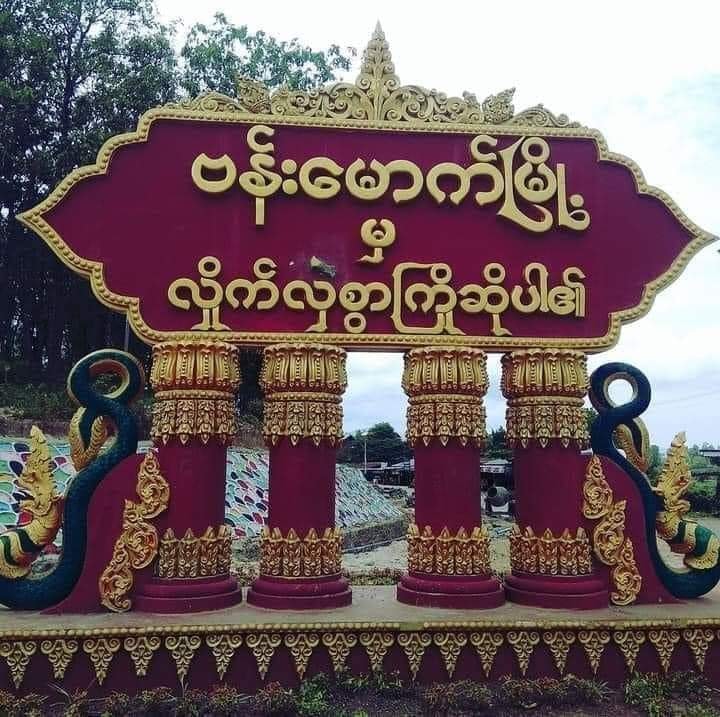
Entrance to Banmauk Town
" We can say that it is peaceful in comparison with that PDFS were here before. When they were here, SNA came and fought to regain its territory. And the Tatmadaw also came here. So, it was not peaceful here. But PDFs have left. Although they have left, they come back and fight. But the situation is not so bad. Not very long ago, the Tatmadaw came and attacked with an airplane. After that it's been more stable. Battles break out every so often. But it's not that bad any more. For the time being, we can say it's stable. Schools have reopened. The schools in the western part are opening self-supporting types." he said.
At present, KIA/PDF have controlled the southern part and northern part of Banmauk and allowed the flow of commodities in those parts.
So, if a barrel of oil is paid 600,000 kyats in the south and north parts, it is paid 800,000 kyats in the town and western part, he said.
The flow of commodities through Banmauk has been cut by KIA/PDF and they have destroyed the main road with heavy machineries, said a Banmauk resident to CNI News.
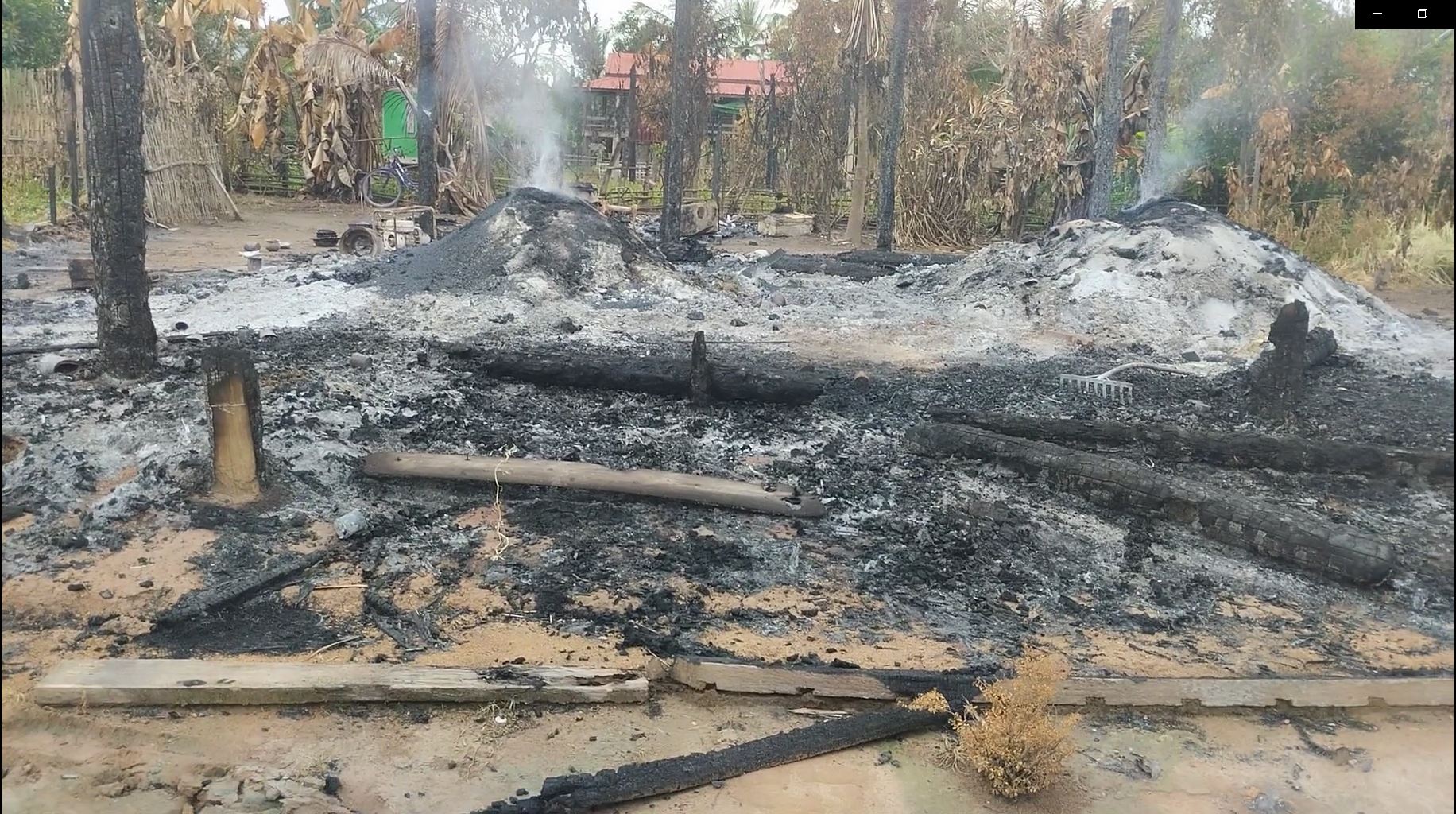
Houses and rice in Kyaung Le Village burned by KIA/PDF
" PDFs don't let the commodities enter here. Fuel and foodstuff are not allowed. But commodities have to be imported without making them know. If they catch you, you'll have to pay the fine. If they catch you carry the goods on a motorcycle, you have to pay 50,000 kyats for the fine. Some people who carry the goods without their knowledge are beaten. They have destroyed the main road with backhoes. Banmauk-Indaw road has been destroyed as well like this. The road between Banmauk and southern part also has been destroyed. You can't go to southern part and western part. They have created to enable cars not to go easily. They have allowed us to send food and oil to the southern villages. They have cut off the town only. The army has been deployed in the town." he said.
KIA/PDF set fire to over 30 houses in Kyaung Le VIllage at the end of July, said locals.
Because the battles are breaking out between the two sides and public roads have been blocked, the flow of commodities is stopping and foodstuff also are scarce there reportedly.
Moreover, due to the battles that arose from the political changes, about ten thousand locals have displaced reportedly.

- By CNI
- Category: English Section
- Hits: 656
CNI News
11 August 2023
Flood arose from ceaseless rain, which damaged about ten thousands acres of rain-fed rice, said farmers.
Rainfed rice that has been grown in Kyauk Taw, Mrauk U, Min Pya and Ponna Kyun townships which are located along Lay Myo, Kaladan and Ma Yu rivers was sunk in water and damaged, said farmers from Rakhine.
About ten thousand acres of rainfed rice could be damaged by the flood in Mrauk U Township where there are more than one hundred thousand acres of rainfed rice, said U Maung Thein Hla, secretary of the Danyawadi Farmers Federation to CNI News.
" Rice plantations to the west of the Yangon-Sittwe road are not badly damaged, but the plantations to the east of the road are badly damaged. The plants are no more in some places. There are about 120,000 acres of rice and of them, about ten thousand acres of rice have been damaged. Now the farmers there are preparing to plant rice again." he said.
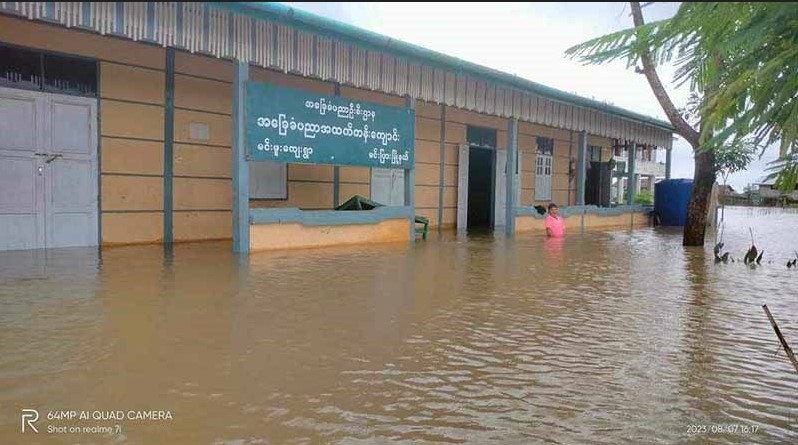
Flood taking place
There are about 750,000 acres of rainfed rice planted in Rakhine State this year and although rice can be planted in the places damaged, because rice to be transplanted was damaged due to the Mocha cyclone, currently it is difficult to find the rice to be transplanted, said farmers from Rahine State.
Because it was raining ceaselessly in Rakhine State on 2nd August, water level of the Kaladan River raised and about half of the rainfed rice acres in Kyauktaw Township was possibly damaged, U Maung Tui, a farmer from Kyauktaw Township to CNI News.
" Damage seems to be a lot. 50 percent or so will be damaged, I think. 80 percent of my rice plantation has been damaged. I think I'll grow rice again." he said.
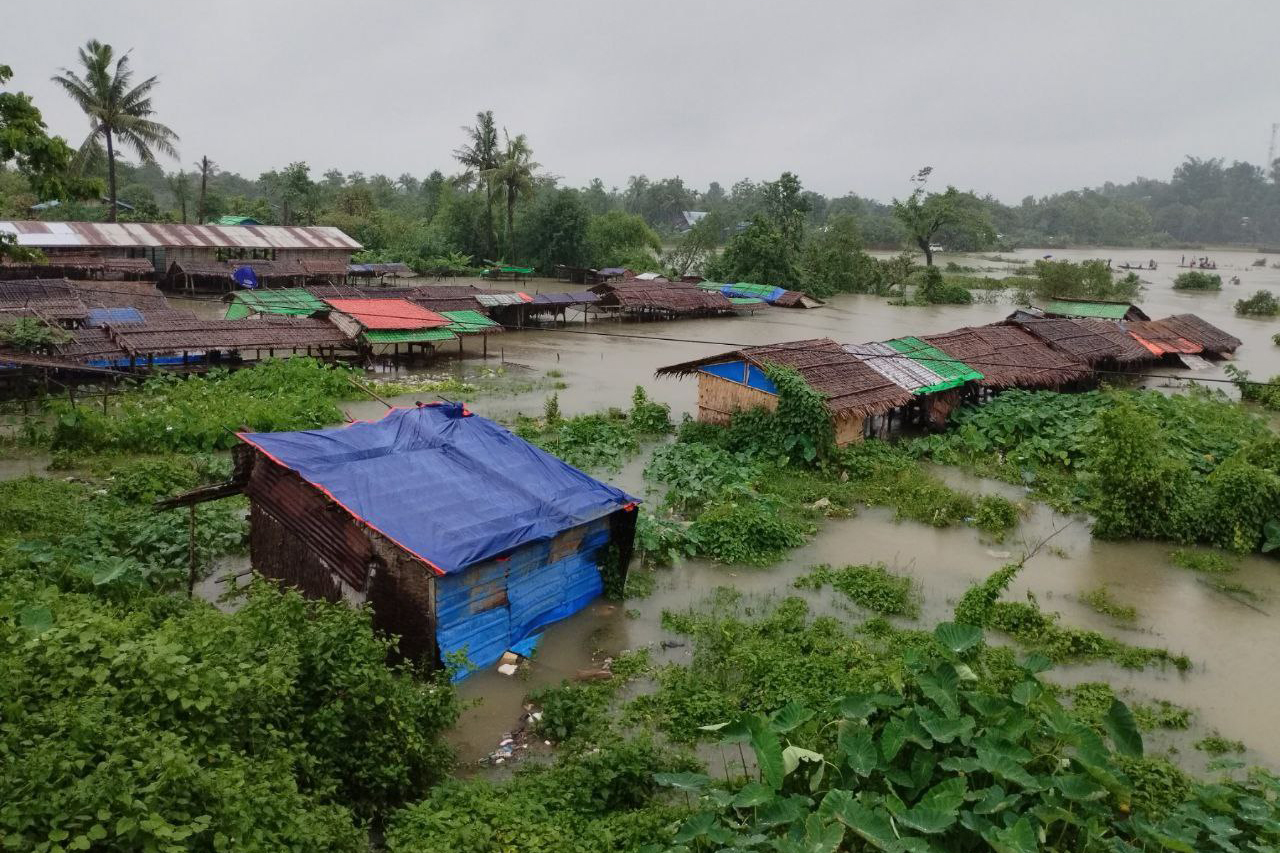
Flooding in Minbya Township, Rakhine
In the same way, as it was raining ceaselessly in Bilin, Paung and Thaton Townships in Mon State a few days ago, Bilin River flooded and rainfed rice was sunk.
Short-term rice only could be grown at the places that were sunk. But if it rains heavily again, rice can be ruined," said Ko Lwin Aye, a farmer from Paung Township to CNI News.
"Rice that was sunk is largely dies. Rice plantations in Kyauk Yedwin and Tamar Baung were badly damaged. When the water declines, short term rice can be grown. But you can't take it for granted. We get much rain in July and August." he said.
Relevant governments have not recorded in relation to the damage of rainfed rice in Mon and Rakhine State, said farmers. Relevant ministries record the amount of rainfed rice damaged and should provide the farmers with necessary aids, said farmers.

- By CNI
- Category: English Section
- Hits: 678
CNI News
10 August 2023
As the National Unity Government had said that 2023 would be the decisive year in the civil war, There are discussions and reviews among politicians from local and abroad whether it will come true or not.
Armed conflicts between the Tatmadaw and some EAOs/ PDF joint forces are taking place widely throughout the country.
There would be no victory or defeat from the current battles and armed revolution would take long, said U Li Paw Reh, chairman of the Lisu National Development Party (Dulei Party) to CNI News.
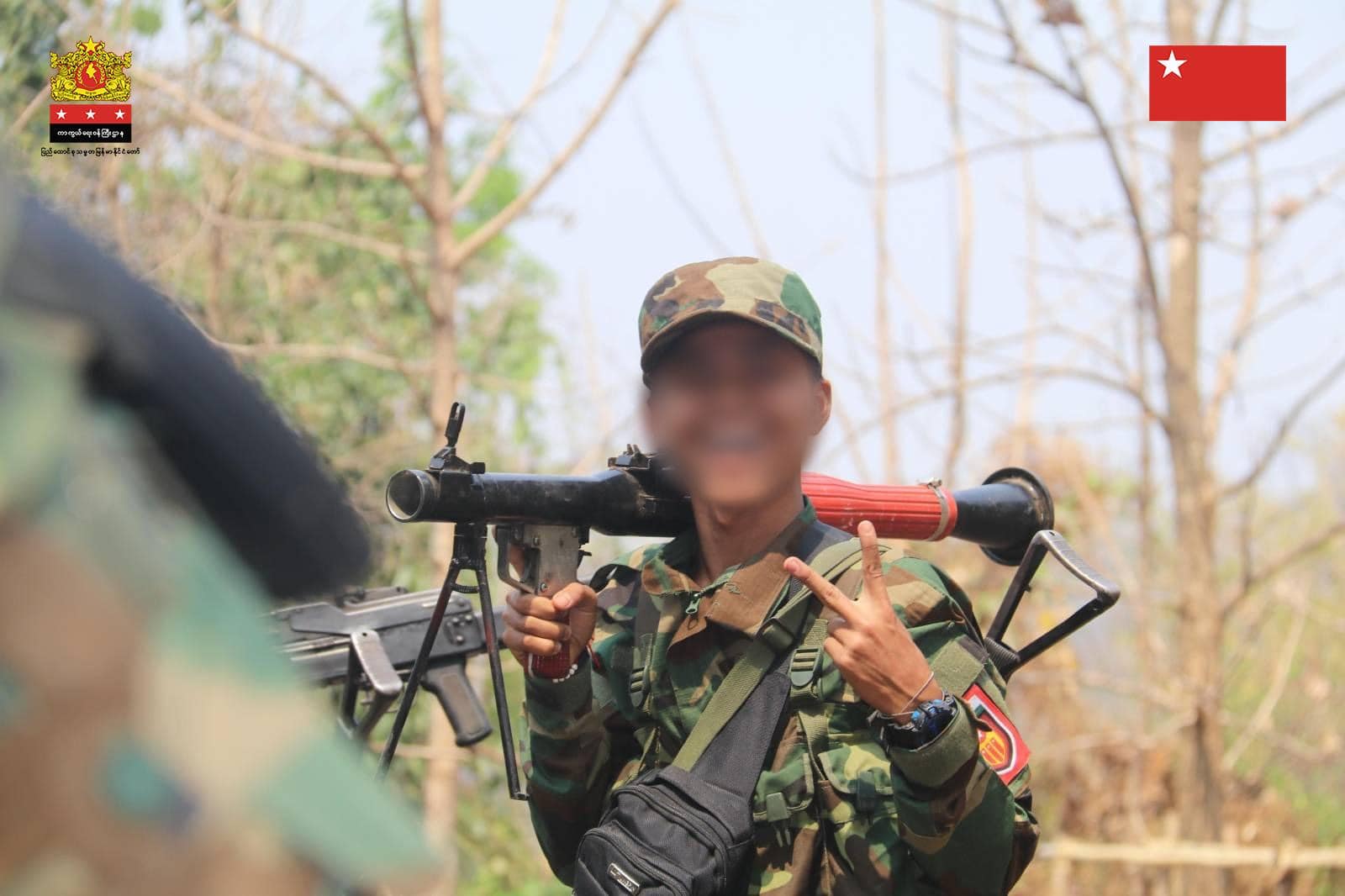
A PDF comrade (NUG-fb)
"There will be no victory or defeat, I think. NUG won't be able to defeat the whole large Tatmadaw except making the people get into trouble. And the Tatmadaw won't be able to get rid of about a hundred EAOs in one go. So, the great armed revolution will take long, I think so." he said.
Now It is the time when the whole public is waging the final battle in all possible ways, opening all fronts _ military, financial, foreign affairs, the public movement, psychological warfare fronts, said in the letter sent by the NUG to the ceremony of the 35th annual commemoration of the 8888 Uprising.
" No one can say when this revolution will end. But you have to do what you have to. We need to fight with speed and momentum to make our revolution stronger while the military group is weak." said Khun Tun Myint, chairman of the Pa-O National Federal Council (PNFC) to CNI News.
The NUG said that 2023 was the decisive year of the Spring Revolution at the press conference relating to the review on a full year of the people's revolutionary war and laying down the procedures to be performed held on 7th October 2022.
Currently, Battles are breaking out between the Tatmadaw and some EAOs/PDFs joint forces in Kayin, Kayah, Chin States, Sagaing and Magway Regions.

- By CNI
- Category: English Section
- Hits: 644
CNI News
10 August 2023
The main stumbling blocks which prevent building a union that is based on democracy and federalism are ethnic armed conflicts, said Sr-Gen Min Aung Hlaing, chairman of the State Administration Council.
He said that as above while he was meeting with officials from the union ministries on 8th August 2023.
Democracy means democratic governance and federalism means a union that combines with federal authority. Because a variety of ethnic people live in Regions and States, when implementing the federalism, it must be carried out on the basis of the region instead of the race, said Sr-Gen Min Aung Hlaing.
" Federal rights have been granted in the constitution. You may know it if you study the constitution. As the constitution has been enacted in accordance with the people's desire after a referendum was held, If it is consistent with the will of the people, in order to amend the points that should be amended the Tatmadaw has agreed." he said.
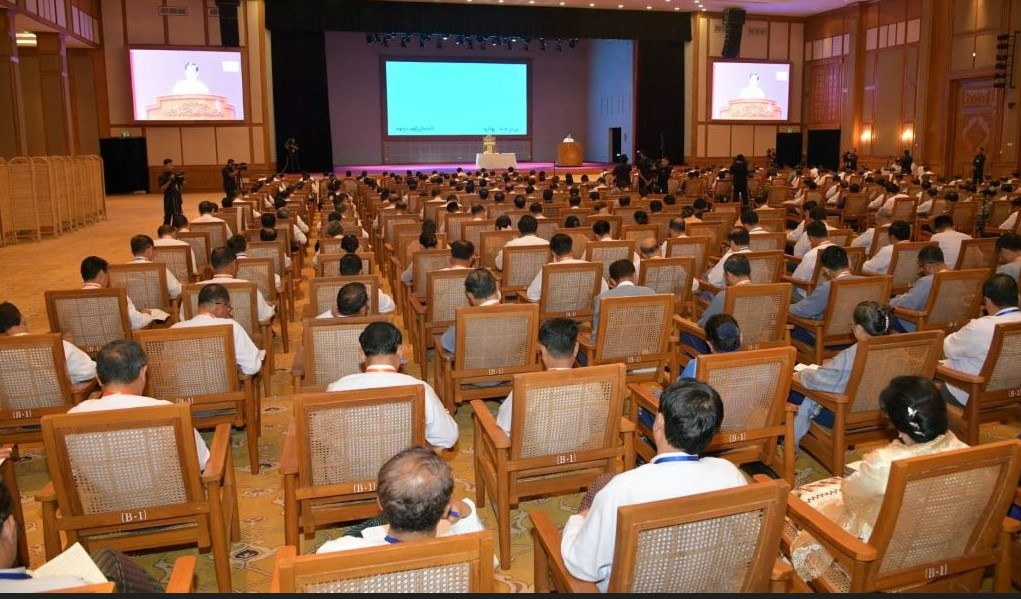
Sr-Gen Min Aung Hlaing meeting with the members of the union government
It was necessary to combine the democratic governance with federal rights in a balanced manner, said chairman of the SAC.
" In order to build a union based on democracy and federalism, the main stumbling blocks are armed ethnic conflicts taking place. In relation to ethnic rights, it is necessary to carry out, thinking long term in accordance with the realities of the current country." said Sr-Gen Min Aung Hlaing.
Nine new objectives will be implemented after the SAC and the union government were reshuffled and the first point is to cement a disciplined, genuine multiparty democratic system and build a Union based on democratic and federal systems. Second point is to perform emphatically in line with the agreements from the NCA for.
the perpetual peace in the whole country. Third point is to carry out emphatically to enjoy the safety of socioeconomic life of the people and to fully achieve the peace and stability, and rule of law in the entire union.
However, at present, Myanmar people cannot use enough electricity and they are suffering from high prices of basic foods.
Moreover, transportation is not safe and job opportunity is scarce. Moreover, the people are suffering from monetary inflation and there is no rule of law.

- By CNI
- Category: English Section
- Hits: 696
CNI News
10 August 2023
U Henry Van Thio, vice president-2 of the NLD government had been expelled from the NLD party because he attended the National Defense and Security Council meeting held by the State Administration Council said in a statement released by the NLD's exiled Central Working Committee on 9th August.
Although U Henry Van Thio was faithfully assigned by the party during the Hluttaw's tenure 2016-2021, he was found to cooperate with the military group on 31st July, 2023, said in the statement.
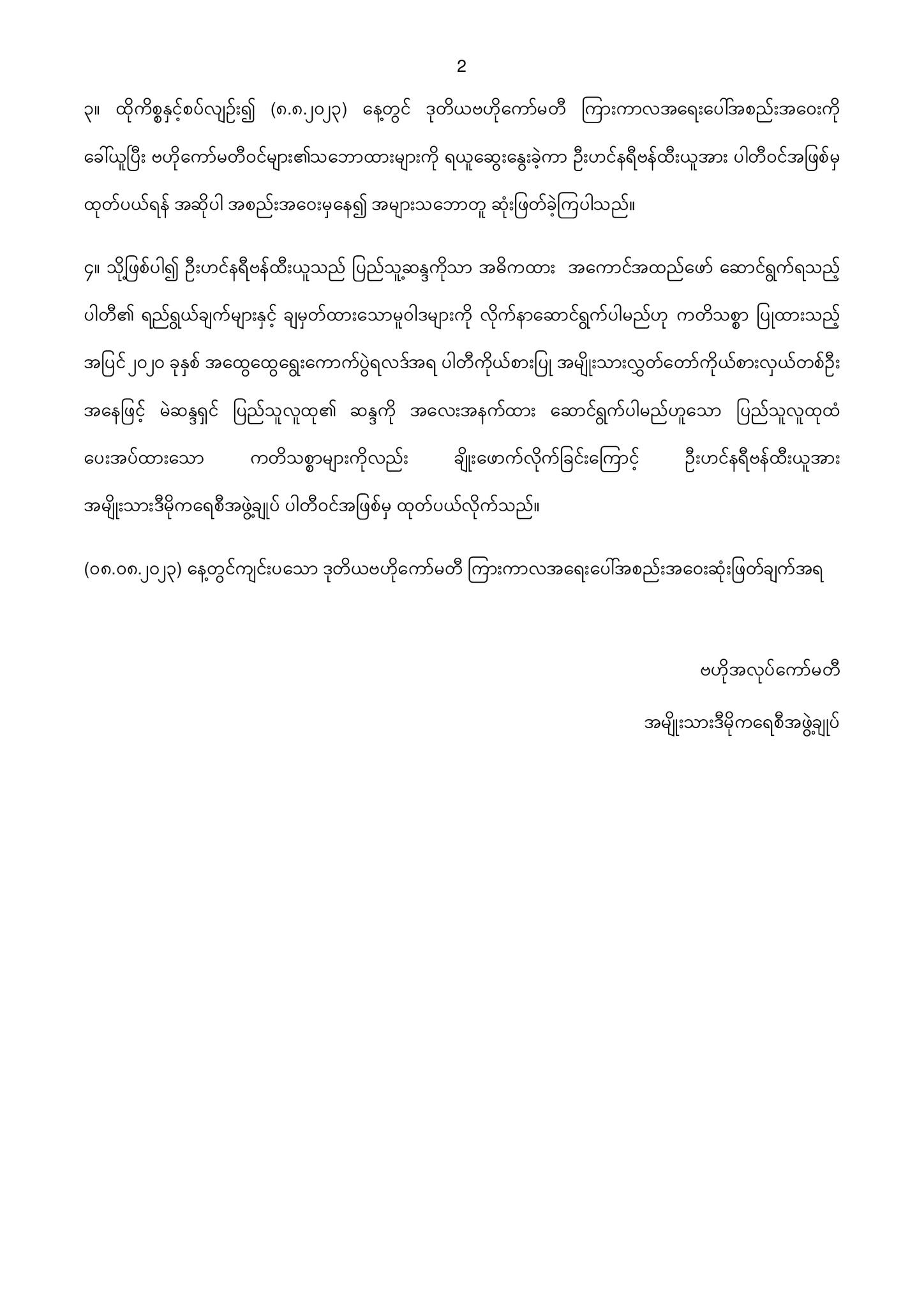
NLD CWC's statement that expelled U Henry Van Thio
In relation to that matter, Second Central Committee Interim Emergency meeting was called and the opinions of the central committee members were discussed and decided to expel U Henry Van Thio from the party, said in the statement.
The Central Working Committee announced on 3rd March, 2023 that it had expelled U Phyo Min Thein, member of the Central Executive Committee, Daw Sandar Min, U Toe Lwin and U Win Myint Aung, members of the Central Committee from the party.
According to the rules laid down by the NLD, those who fled to a foreign country were not allowed to form a central working committee and the CWC was illegal, replied the members who were dismissed.

- By CNI
- Category: English Section
- Hits: 695
CNI News
9 August 2023
Because some parts of the road of the New Asia Highway collapsed and damaged due to the torrential rain, the delivery of goods has been stopped, said Myanmar highway delivery entrepreneurs.
It was raining heavily in Kayin State on 7th August and some parts of New Asia Highway between Kawkareik and Myawady collapsed.
Moreover, trucks could not go on the old road because ground below the road was getting lower, said a highway delivery businessman to CNI News.

Flooding on New Asia Highway somewhere between Kawkareik and Myawady on 5th August 2023
"It happened yesterday. No one has gone. For the time being, we have stopped delivery. A man can't even go. You can't even go on a motorcycle. On the old road too, the ground below a bridge is getting lower and trucks can't go. It can take about five days if it is repaired. Cargo shipments for both import and export have stopped. There are other roads but they can't help to support the cargo shipment" he said.
When the old Asia highway has been repaired already, although 12 wheel trucks and other lorries can go, box container trailers can't go.
So, container trailers have to wait until New Asia Highway has already been repaired, said U Aung Moe, chairman of the Transportation and Logistics Management Federation to CNI News.
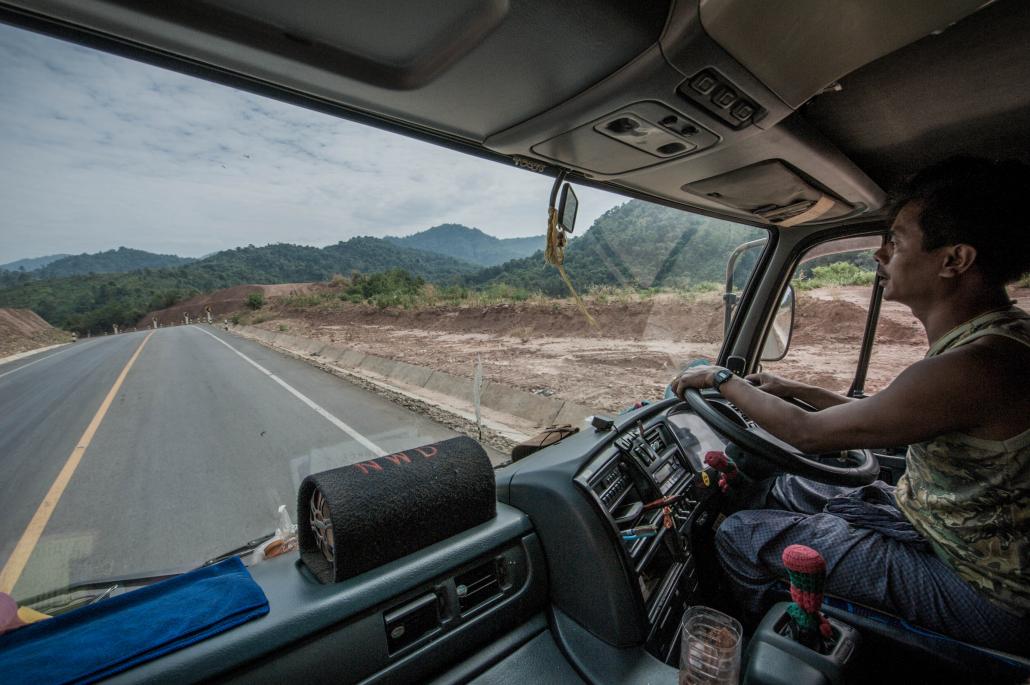
A truck driver on the new Asia highway between Thailand and Myanmar (Frontier)
" Tomorrow or the day after tomorrow, the old road can be used for small cars and 12 wheel trucks but not for 40 foot long container cars." he said.
The Asia Highway is the main important route in the transportation of goods between Myanmar and Thailand and a variety of trucks are going and coming daily on the road.
Moreover, those who will go to Thailand for work, buses and family cars are are going and coming on it as well. If the Asia Highway that has damaged is not quickly repaired, the flow of commodities between the two countries may delay and domestic freight transport may be affected as well, said traders and businessmen.

- By CNI
- Category: English Section
- Hits: 661
CNI News
9 August 2023
There are discussions among political circle relating to how the ongoing political crisis will be overcome from the experience of the public uprising that occurred in 1988 in Myanmar and they are looking for a way that can overcome the crisis.
Although 8888 uprising has been 35 years long, the unity between the military and the civil has not been achieved. Moreover, armed conflicts are breaking out widely.
The All Burma Students Democratic Front that started an armed revolution from the 8888 Uprising accepted that the problem for the change of the country must be solved through dialogue, Yebaw Aye Lwin, spokesperson of the ABSDF to CNI News.
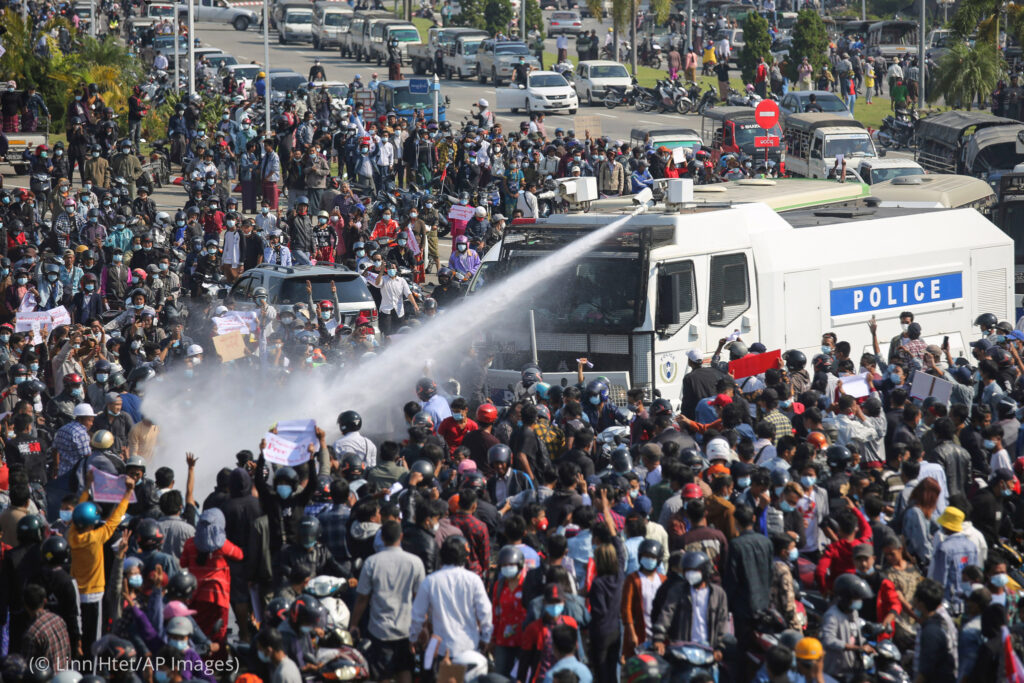
People demanding democracy and police force
"what we talk about depends on the time and condition. We, ADSDF, have accepted the dialogue as a process. In the past we held discussions. There will be a time when we will have to meet and discuss, I believe. We'll have a dialogue as a process when we change the country, that I accept. We have always said to enable those who should participate to take part in the dialogue. We never refused a dialogue." he said.
Due to the political landscapes that arose after February 2021, armed conflicts have been widely taking place Without ability to build the people's politics, democracy could not be won, said U Sein Win, former member of the Hluttaw to CNI News.
"Due to the lack of regulations and systematic management, we reached the current situation. This happened because of weak action-taking. Now we are also, taking lessons from the past, responding on the status quo with two ways. One is the Spring Revolution. According to our age and our experience, without ability to build the people's politics, we can't win the democracy." he said.
The country is facing with crises due to the current armed conflicts and although there are attempts to solve the problem, it has not been solved up to now.

- By Nan Shwe Sin Htun
- Category: English Section
- Hits: 587
CNI News
August 8, 2023
The ultimate goal of the State Administration Council was to hold a free and fair general election of the multi-party democratic system and actions must be taken to ensure stability throughout the country, said Sr-Gen Min Aung Hlaing, chairman of the SAC.
He said as above during a meeting with the members of the SAC that was reshuffled on 7th August, 2023.
He would go on performing to ensure the peace and stability of the country and strive to make the goals successful, he said adding that due to the actions of so-called PDFs and some EAOs, not only peace and stability, rule of law and regional development but also rights to education of the students were greatly damaged.
" As for us, actions must be taken to ensure peace and stability, and rule of law and the ultimate goal of the SAC is to hold a free and fair general election of the multi party democratic system. So, we must carry out to ensure peace and stability throughout the country so that the election can be held successfully" he said.
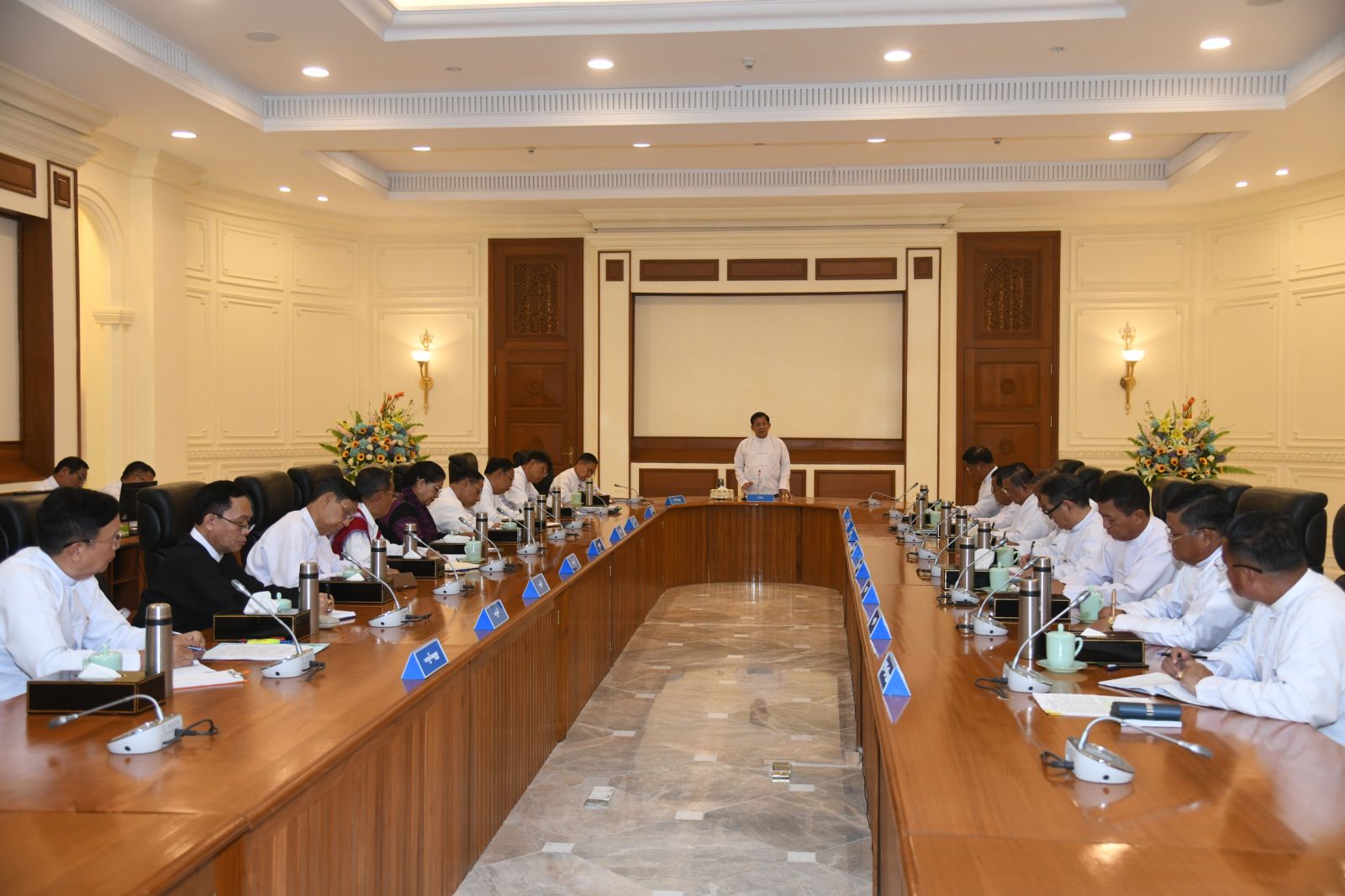
The Tatmadaw was carrying out emphatically in accordance with the NCA agreements to ensure peace and stability in the ethnic regions and the EAOs also needed to do so, said the chairman of the SAC, adding that peace and regional development could not be performed with conservative thinking and concepts and it was necessary to think and act in accordance with the current reality of the country.
"If the SAC's performances for the peace and stability, rule of law and the development of the people's social economy were disturbed, their development would be delayed." Said Sr-Gen Min Aung Hlaing.
Sr-Gen Min Aung Hlaing. He wanted to urge the entire people to cooperate with the SAC to ensure the peace and stability and to strengthen the multi-party democratic system, he said.
The battles are severely taking place between the Tatmadaw and the EAOs/PDFs in Sagaing, Magway, Tanintharyi Regions, Chin, Kachin, Kayin,and Kayah States.
Due to the battles, there are about one million IDPs and agriculture and other regional businesses have declined so much reportedly.

- By CNI
- Category: English Section
- Hits: 629
CNI News
8 August 2023
While there have been increasingly unstable in Thailand due to political turmoil and protests there, Myanmar workers had better not change their workplaces, those who are helping Myanmar migrant workers said to CNI News.
Although a general election was held in Thailand in May, a Prime Minister and a new government have not yet been appointed up to now. Moreover, Thai people's protest against the Pheu Thai Party is also strong.
Not knowing how the current situation would be changed, Myanmar migrant workers had better not change their workplaces before a new Thai government was formed, said U Aung Kyaw, an official from the Labor Rights Foundation to CNI News.
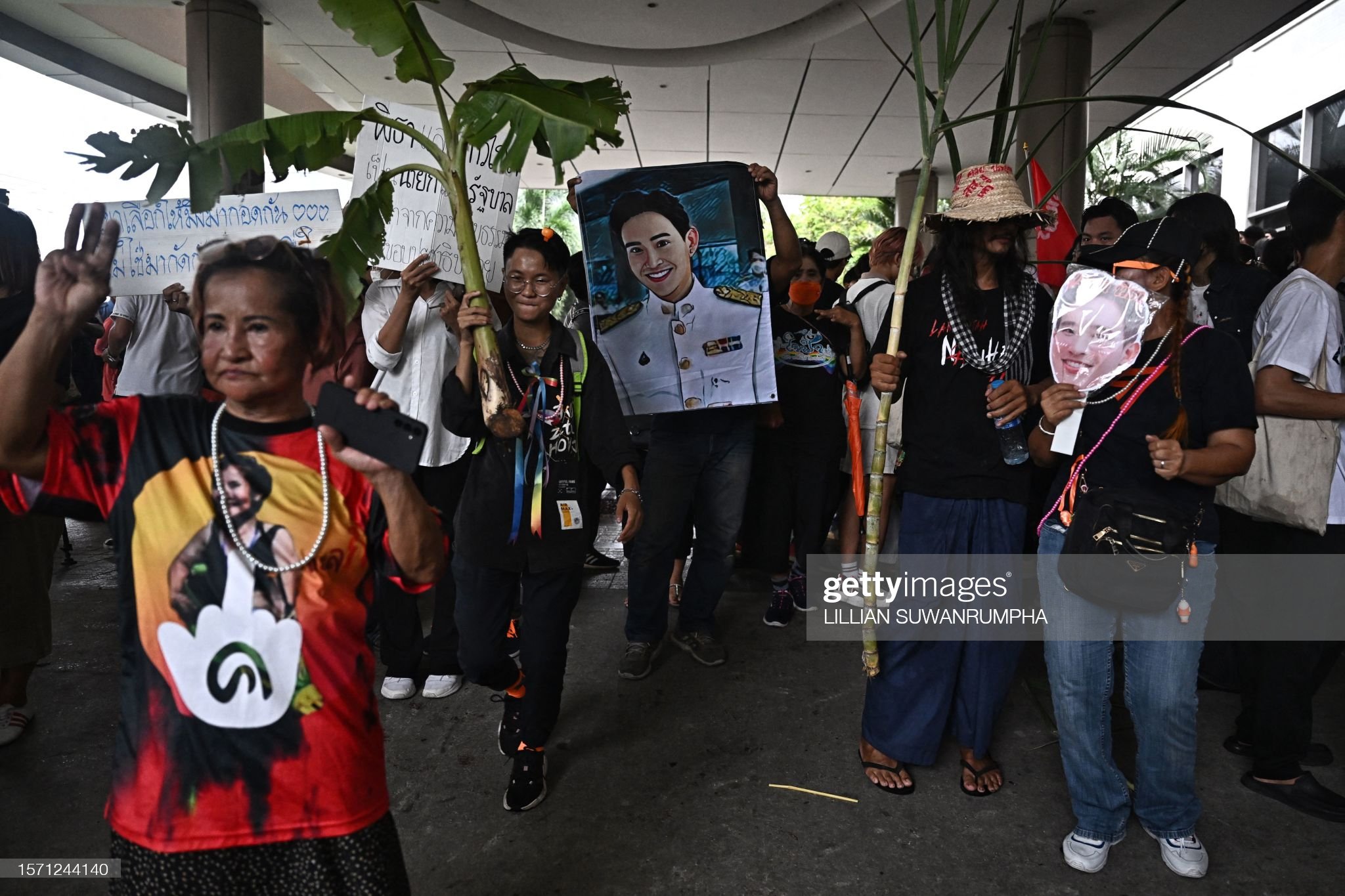
Demonstrations relating to the position of Prime Minister were being held in Thailand (photo-Getty Images)
" Thai economy is not doing very well right now. If you apply for a new job, it will not be accepted easily. A lot of workers are not needed there. So, it may be difficult if a new job is applied. At a time when Thailand's political situation is complicated, Myanmar workers will need to go on working in their current workplaces, that I want to advice. Because the employers are working with existing workers without much change at present, workers shouldn't think about changing their jobs at all." he said.
Although the election of a Thai Prime Minister by vote was scheduled to hold on 4th August, Wan Muhamad Noor Matha, Speaker of the House of Representatives canceled the schedule on 3rd August.
The parliament's ban on the nomination of Pita Limjaroenrat, leader of the Move Forward Party that won the most seats in the election for the post of Prime Minister - whether it is constitutional or not will be considered.
So, the election of a Prime Minister has been put off. Moreover, the Pheu Thai Party that won second most seats in the election parted way with the MFP and expelled the MFP from the coalition on 2nd August, which the MFP supporters were not satisfied with and protested against it.
Although not changing workplace was the best for these reasons, if there were rights violations in workplace, the workplace should be changed, said Ko Naing Naing Aung, director of the Arakan Workers Organization to CNI News.
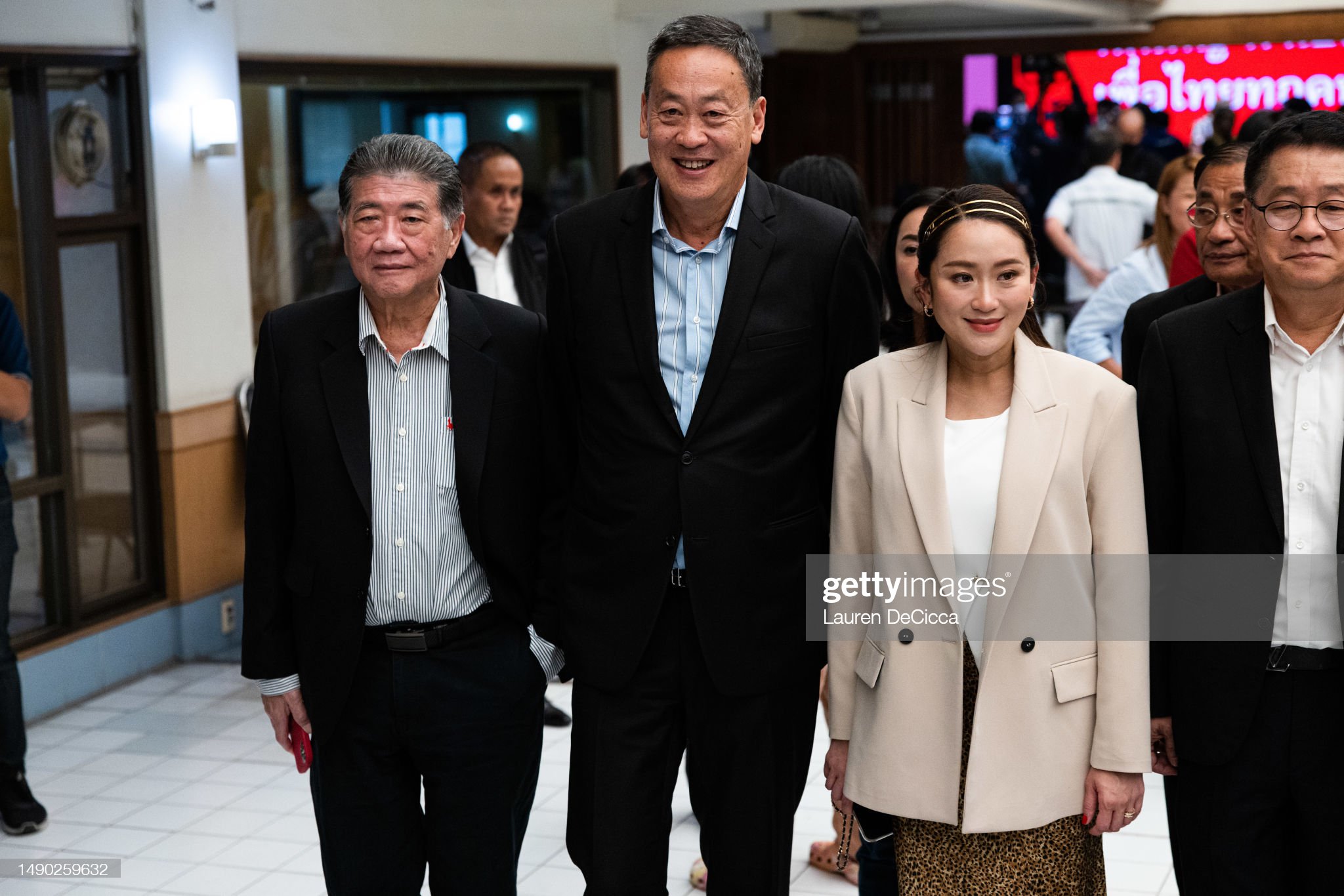
Some members of the Pheu Thai Party (photo-Getty Images)
" You need to look back at the documents you have hold whether you can change your job or not. If you can, you must go to a better place. It's no problem. If your rights were violated, not safe and dangerous to your life at the place where you are working, it would be the best for you to change your workplace." he said.
Illegal migrant workers in Thailand were asked to nominate until the end of July and those who have been nominated are allowed to live until the end of August reportedly. Because the policies relating to migrant workers can be laid down only when a new government is formed, Thai businessmen are also expecting the stakeholders to form a new government as soon as possible.
There are demands to form the government within a month. There are over two million migrant workers including Myanmar workers in Thailand until February 2023 and several million illegal migrant workers there reportedly.



